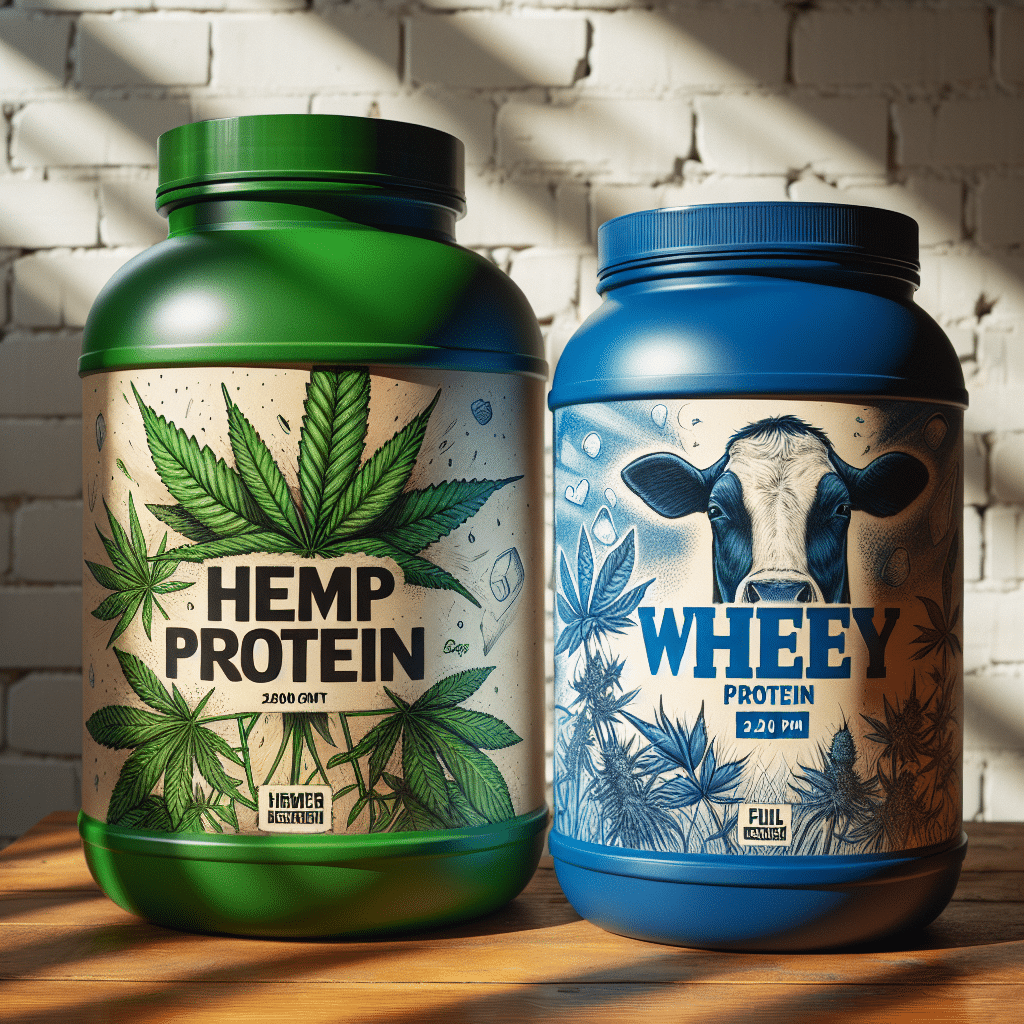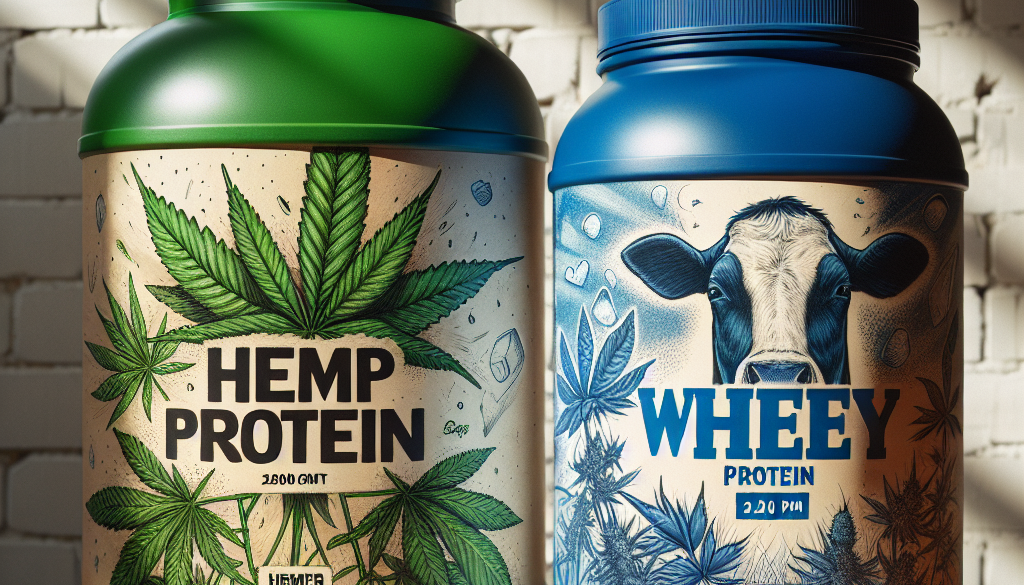Is Hemp Protein Better Than Whey Protein?
-
Table of Contents
- Hemp Protein vs. Whey Protein: Which Reigns Supreme?
- Understanding Hemp Protein
- Understanding Whey Protein
- Comparing Hemp and Whey Protein
- Protein Quality
- Dietary Restrictions and Preferences
- Health Goals
- Scientific Research and Case Studies
- Potential Drawbacks
- Conclusion: Weighing Your Options
- Discover ETprotein’s Premium Protein Products
Hemp Protein vs. Whey Protein: Which Reigns Supreme?

When it comes to protein supplements, the debate between hemp and whey protein is a hot topic among fitness enthusiasts, health-conscious individuals, and those following plant-based diets. Both types of protein offer unique benefits and can be incorporated into a balanced diet, but which one is truly better? This article delves into the nutritional profiles, benefits, and potential drawbacks of hemp and whey protein to help you make an informed decision.
Understanding Hemp Protein
Hemp protein is derived from the seeds of the Cannabis sativa plant. Unlike other parts of the cannabis plant, hemp seeds contain only trace amounts of THC, the psychoactive compound, making them safe and legal for consumption. Hemp protein is gaining popularity as a plant-based alternative to animal-derived proteins.
- Nutritional Profile: Hemp protein is a complete protein, containing all nine essential amino acids. It’s also rich in fiber, healthy fats, including omega-3 and omega-6 fatty acids, and various minerals such as iron, magnesium, and zinc.
- Digestibility: Thanks to its high fiber content, hemp protein can aid digestion. However, the fiber may also reduce the protein’s bioavailability compared to other sources.
- Environmental Impact: Hemp is a sustainable crop that requires less water and pesticides than many other plants, making it an eco-friendly choice.
Understanding Whey Protein
Whey protein is a byproduct of cheese production and is a staple in the supplement industry. It’s favored for its high biological value and rapid absorption rate, making it a go-to for muscle repair and growth.
- Nutritional Profile: Whey protein is a complete protein and is particularly high in branched-chain amino acids (BCAAs), which are crucial for muscle building and recovery.
- Digestibility: Whey protein is quickly and easily absorbed by the body, which is why it’s often consumed post-workout for immediate muscle repair.
- Allergenic Potential: Whey protein can cause issues for those with lactose intolerance or dairy allergies.
Comparing Hemp and Whey Protein
When comparing hemp and whey protein, several factors come into play, including protein quality, dietary restrictions, and personal health goals.
Protein Quality
Whey protein is considered to have a higher biological value than hemp protein, meaning the body can utilize it more efficiently. However, hemp protein’s complete amino acid profile and additional nutrients make it a well-rounded supplement.
Dietary Restrictions and Preferences
For vegans, vegetarians, or those with dairy allergies, hemp protein is a clear winner. It’s plant-based and free from common allergens. Whey protein, on the other hand, is derived from dairy and may not be suitable for everyone.
Health Goals
If building muscle is your primary goal, whey protein’s high BCAA content and fast absorption might be more beneficial. For those seeking a more balanced nutrient intake and a boost in fiber, hemp protein is the better choice.
Scientific Research and Case Studies
Several studies have compared plant-based proteins to whey protein, with mixed results. One study found that rice protein supplementation post-workout offered similar benefits to whey protein in terms of body composition and exercise performance. While hemp protein wasn’t the focus, this suggests that plant-based proteins can be on par with whey.
Another study highlighted that while whey protein promoted greater muscle protein synthesis than soy protein, the differences were not significant when total protein intake was adequate. This indicates that the source of protein might be less important than the overall protein consumption.
Potential Drawbacks
Both hemp and whey protein have potential drawbacks that should be considered:
- Hemp Protein: It’s typically lower in protein content per serving compared to whey and has a grittier texture that some may find unpalatable.
- Whey Protein: It can cause digestive issues for those with lactose intolerance and has a higher environmental impact due to dairy farming practices.
Conclusion: Weighing Your Options
In conclusion, whether hemp protein is better than whey protein depends on individual dietary needs, preferences, and environmental considerations. Hemp protein offers a plant-based, nutrient-rich alternative with a complete amino acid profile, while whey protein provides a high-quality, rapidly absorbed protein ideal for muscle building. Ultimately, both can be part of a healthy diet, and the choice between them should align with your personal health goals and values.
Discover ETprotein’s Premium Protein Products
If you’re looking for high-quality protein supplements, consider ETprotein’s range of organic, non-GMO, allergen-free vegan proteins. Their products cater to various industries and dietary needs, ensuring you find the perfect fit for your lifestyle.
About ETprotein:
ETprotein, a reputable protein and L-(+)-Ergothioneine (EGT) Chinese factory manufacturer and supplier, is renowned for producing, stocking, exporting, and delivering the highest quality organic bulk vegan proteins and L-(+)-Ergothioneine. They include Organic rice protein, clear rice protein, pea protein, clear pea protein, watermelon seed protein, pumpkin seed protein, sunflower seed protein, mung bean protein, peanut protein, and L-(+)-Ergothioneine EGT Pharmaceutical grade, L-(+)-Ergothioneine EGT food grade, L-(+)-Ergothioneine EGT cosmetic grade, L-(+)-Ergothioneine EGT reference grade and L-(+)-Ergothioneine EGT standard. Their offerings, characterized by a neutral taste, non-GMO, allergen-free attributes, with L-(+)-Ergothioneine purity over 98%, 99%, cater to a diverse range of industries. They serve nutraceutical, pharmaceutical, cosmeceutical, veterinary, as well as food and beverage finished product distributors, traders, and manufacturers across Europe, USA, Canada, Australia, Thailand, Japan, Korea, Brazil, and Chile, among others.
ETprotein specialization includes exporting and delivering tailor-made protein powder and finished nutritional supplements. Their extensive product range covers sectors like Food and Beverage, Sports Nutrition, Weight Management, Dietary Supplements, Health and Wellness Products, and Infant Formula, ensuring comprehensive solutions to meet all your protein needs.
As a trusted company by leading global food and beverage brands and Fortune 500 companies, ETprotein reinforces China’s reputation in the global arena. For more information or to sample their products, please contact them and email sales(at)ETprotein.com today.












